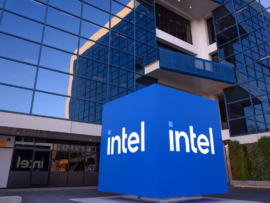
Intel is getting a $2 billion injection from the Japanese holding company SoftBank. The two tech giants say this is a demonstration of their commitment to investing in semiconductors in the United States.
The investment will make SoftBank Intel’s fifth biggest investor, with the conglomerate paying $23 per share of Intel common stock. Lip-Bu Tan, Intel’s CEO, said in a statement that he “appreciate(s) the confidence (SoftBank) has placed in Intel with this investment.”
It is a significant show of support for Intel, which has been struggling amid the artificial intelligence boom. Unlike rivals that specialise in either chip design or manufacturing, Intel continues to operate in both sectors, a strategy that has left its fabrication efforts lagging behind its main rival, Taiwan Semiconductor Manufacturing Company (TSMC).
In 2024, Intel’s stock declined by 60%, and the company fell from first to second place on Gartner’s list of top global semiconductor vendors by revenue growth. It was also Intel’s first unprofitable year since 1986, posting a net loss of $18.8 billion.
Tan needs SoftBank’s lifeline after a difficult few months
Tan took over as CEO in March after his predecessor, Pat Gelsinger, failed to deliver on plans to expand new fabs and advance the legacy 18A chipmaking process. Despite rumours suggesting Intel might outsource some of its foundries to TSMC, Tan is committed to retaining them. He sees the foundries as critical to reducing US reliance on foreign chipmakers, with Intel being the only American firm capable of producing advanced semiconductors.
Still, the foundry division has yet to land a key customer after losing US chip giant NVIDIA to TSMC, and Tan has been forced to pause construction of new chip plants until demand strengthens. He has made some other drastic moves to improve efficiency, such as cutting 15% of the workforce, revamping internal processes, and spinning off assets that don’t support his mission.
US administration wants to see Intel succeed
SoftBank’s support for Intel may stem from Tan’s ties with the company, having served as an external board director between 2020 and 2022, and its CEO, Masayoshi Son, is a close friend of his. The two companies already work together on Saimemory, a startup developing stacked DRAM memory chips for AI applications.
The partnership could serve Intel well, as SoftBank is a large player in the global chip and AI industries. SoftBank acquired chip designer Arm in 2016, which counts NVIDIA as a client, and has plans to acquire another designer, Ampere. SoftBank is also an initial equity funder of the Stargate initiative, which plans to invest $500 billion in AI infrastructure in the US over four years, and, in April, made the largest private tech deal on record with its $40 billion investment in OpenAI.
“For more than 50 years, Intel has been a trusted leader in innovation,” Son said in a statement. “This strategic investment reflects our belief that advanced semiconductor manufacturing and supply will further expand in the United States, with Intel playing a critical role.”
But SoftBank is not Intel’s only cheerleader. The US government is reportedly discussing taking a 10% stake in Intel, making it the largest shareholder, which would help boost Intel’s capacity. President Donald Trump has been heavily pushing domestic chip production through high import tariffs and tax breaks, hoping to reap the economic benefits of a shored-up supply chain. He has even started granting NVIDIA licenses to sell its advanced AI chips to China, despite national security concerns.
President Trump has been meeting with Tan regularly, despite calling for his resignation earlier this month.





